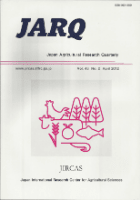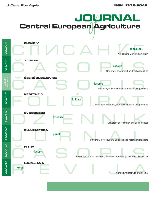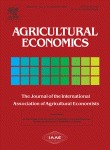
BERICHTE UBER LANDWIRTSCHAFT
Scope & Guideline
Empowering Research in Agricultural Science
Introduction
Aims and Scopes
- Sustainable Agricultural Practices:
The journal aims to explore and promote sustainable agricultural methods, including organic farming, agroecology, and resource-efficient practices that contribute to environmental conservation. - Technological Innovations in Agriculture:
It emphasizes research on the adoption and impact of digital technologies, biotechnology, and precision agriculture, aiming to enhance productivity and efficiency in farming. - Economic and Policy Analysis:
The journal addresses economic issues related to agriculture, including market dynamics, policy implications, and financial viability of agricultural practices, providing insights for policymakers and stakeholders. - Animal Welfare and Husbandry:
There is a strong focus on animal welfare practices, exploring the implications of husbandry methods on livestock health and productivity, as well as ethical considerations. - Regional Development and Value Chains:
The journal investigates regional agricultural developments, emphasizing local value chains, community-supported agriculture, and the socio-economic impacts of agricultural practices.
Trending and Emerging
- Digitalization in Agriculture:
A significant increase in research on digital tools, data analytics, and smart farming technologies highlights the need for farmers to adapt to digital transformations in agriculture. - Climate Change Adaptation Strategies:
There is a growing emphasis on strategies for adapting agricultural practices to climate change, including the development of resilient crops and sustainable land management practices. - Agroecological Approaches:
Emerging interest in agroecology reflects a trend towards integrating ecological principles into agricultural practices, promoting biodiversity, and enhancing soil health. - Consumer Behavior and Food Systems:
Research exploring consumer preferences, food security, and sustainability in food systems is trending, particularly in response to changing dietary habits and environmental concerns. - Animal Welfare Innovations:
There is an increasing focus on innovations that enhance animal welfare standards in livestock farming, reflecting societal shifts towards ethical treatment of animals and sustainability.
Declining or Waning
- Traditional Farming Practices:
There is a noticeable decrease in discussions surrounding traditional farming methods, as the focus shifts towards innovative and sustainable practices that align with modern agricultural challenges. - Historical Agricultural Studies:
Research that primarily focuses on historical perspectives of agriculture, such as ancient farming techniques or historical crop varieties, is becoming less prevalent in favor of contemporary analyses and future-oriented studies. - Generic Crop Studies:
Studies that do not address specific regional or technological contexts, focusing instead on broad crop classifications, are declining as there is a growing demand for research that tailors findings to specific agricultural environments.
Similar Journals

Agriculture-Basel
Championing Innovation in Sustainable FarmingAgriculture-Basel is a prestigious, peer-reviewed journal published by MDPI, specializing in the dynamic fields of agronomy, crop science, food science, and plant science. Established in 2011, this open-access journal serves as a pivotal platform for disseminating innovative research and developments in agricultural practices and technologies. With its impressive impact factor and ranking within the top quartiles in key categories, including Q1 in Agronomy and Crop Science and Q2 in Food Science and Plant Science, the journal has garnered significant attention from the research community. Its current Scopus rankings reflect its influence and importance, with notable positions in agricultural and biological sciences. Aimed at researchers, professionals, and students in the agricultural sector, Agriculture-Basel is committed to fostering a deeper understanding of sustainable practices and advancements in the field. With an emphasis on accessibility, the journal ensures that its valuable content is freely available since its inception, making it a cornerstone resource for all those engaged in contemporary agricultural research and applications.

JARQ-JAPAN AGRICULTURAL RESEARCH QUARTERLY
Harvesting Insights for Ecological BalanceJARQ - Japan Agricultural Research Quarterly serves as a pivotal platform in the field of agricultural sciences, published by the esteemed Japan International Research Center for Agricultural Sciences. Established in 1973, this journal has a rich history and plays a critical role in disseminating significant research findings relevant to agronomy, crop science, animal science, ecology, and biotechnology. Despite its ranking in the lower quartiles, with impressive coverage from 1973 to 2024, it continues to attract contributions that enhance agricultural strategies and practices in Japan and beyond. The journal facilitates discussions that are essential for fostering innovation in agricultural methodologies and environmental sustainability. Accessible to a diverse audience, including researchers, academics, and practitioners, JARQ emphasizes the importance of advancing agricultural research and its implications for food security and ecological balance.

Agrarforschung Schweiz
Pioneering insights into the future of food and environmental stewardship.Agrarforschung Schweiz is a premier journal dedicated to advancing the fields of agronomy, animal science, food science, and environmental studies. Published by AGRARFORSCHUNG in Switzerland, this journal serves as a vital platform for the dissemination of research findings that address contemporary challenges in agriculture and food systems. With an emphasis on open access, researchers and practitioners are encouraged to share their work, fostering a collaborative environment for knowledge exchange. Although currently listed in Q4 of several agricultural categories, the journal is poised for growth and aims to enhance its impact within the academic community. It features a wide range of topics from innovative agricultural practices to sustainability and pollution management, catering to a diverse audience of researchers, students, and industry professionals. Given the rich agricultural heritage of Switzerland, Agrarforschung Schweiz aspires to contribute meaningfully to global discussions and advancements in agricultural sciences through rigorous peer-reviewed research and insights.

Agricultural and Food Economics
Exploring innovative insights for sustainable food systems.Agricultural and Food Economics is a leading journal published by SPRINGERNATURE, dedicated to the advancement of research in the interconnected fields of agriculture, food systems, and economic analysis. Established in 2013 and operating under an Open Access model, this journal serves as a vital platform for scholars and practitioners to disseminate innovative findings and insights that influence policy and practice. With a notable impact reflected in its 2023 quartile rankings—Q1 in Agricultural and Biological Sciences (miscellaneous), Q2 in Economics and Econometrics, and Q1 in Food Science—this journal is recognized for its rigorous scholarly output. It ranks among the top resources in its domain, with Scopus ranks placing it in the 88th percentile for Agricultural and Biological Sciences and the 79th percentile for Economics. The journal covers a broad spectrum of topics, including sustainable agricultural practices, the dynamics of food markets, and the economic implications of food policies. Researchers, professionals, and students alike will find valuable insights and comprehensive analyses that contribute to the ever-evolving discourse on food and agriculture.

PHILIPPINE AGRICULTURAL SCIENTIST
Empowering Research, Transforming Agriculture.PHILIPPINE AGRICULTURAL SCIENTIST is a pioneering journal published by the University of the Philippines Los Baños, dedicated to advancing the fields of Agronomy, Crop Science, Animal Science, and Biotechnology. With an ISSN of 0031-7454, this esteemed journal provides a vital platform for researchers and practitioners focusing on agricultural innovations and practices in the Philippines and beyond. With a robust history dating back to 1996 and continuing through 2024, the journal operates within the Q4 quartile, reflecting its potential for growth and impactful contributions in its categories. Despite currently being positioned in the lower ranks, it serves as an essential publishing venue for nascent studies and localized research, contributing to the agricultural discourse. The journal fosters a collaborative research environment, encouraging submissions from both emerging scholars and seasoned experts, making it a valuable resource for students, professionals, and researchers engaged in the agricultural sciences. While it currently does not offer open access, it plays a crucial role in disseminating vital knowledge aimed at enhancing agricultural practices in the region.

Journal of Central European Agriculture
Cultivating Insights in Crop and Animal SciencesThe Journal of Central European Agriculture, with ISSN 1332-9049 and E-ISSN 1332-9049, is an esteemed platform published by UNIV ZAGREB, FAC AGRICULTURE that caters to the dynamic fields of agronomy, crop science, and animal science. Since its establishment in 2000, this Open Access journal has played a crucial role in disseminating critical research findings while fostering collaboration among academics, researchers, and professionals within the agricultural community. The journal, which is based in the heart of Croatia, spans a rich history of scholarship, with its content available for free to readers and contributors alike. As reflected in its current standings, the journal has achieved a Quartile 3 ranking in Agronomy and Crop Science and Quartile 4 in Animal Science and Zoology for the year 2023, indicating its growing influence within these disciplines. With Scopus ranks placing it in the 32nd percentile among its peers, the Journal of Central European Agriculture is committed to advancing agricultural sciences not only in Central Europe but globally as it prepares for its converged years from 2007 through 2024. This journal serves as a vital resource for innovative research, practical applications, and a deeper understanding of agricultural challenges and solutions.

NJAS-Impact in Agricultural and Life Sciences
Pioneering research that cultivates sustainability and productivity.NJAS-Impact in Agricultural and Life Sciences is a pivotal open-access journal, published by Taylor & Francis Ltd, focusing on the interdisciplinary nexus between agricultural practices and life sciences. Anchored in the United Kingdom, this journal aims to provide a comprehensive platform for the dissemination of innovative research that addresses critical challenges in environmental sustainability, agricultural productivity, and biological advancements. With its inaugural issue dated from 2023 to 2024, NJAS prominently features the latest empirical studies, reviews, and theoretical contributions that enrich existing knowledge and provoke thought among researchers and practitioners alike. Although currently ranking within the lower percentiles across various Scopus categories, the journal aspires to establish itself as a significant contributor to the dialogue on agricultural and environmental sciences. As scholars in these fields seek to bridge the gaps in understanding, NJAS invites submission from diverse perspectives, underscoring the importance of collaborative knowledge-building in addressing the complexities of our changing global landscape.

Journal of Agriculture and Food Research
Connecting Ideas for a Healthier PlanetJournal of Agriculture and Food Research, published by ELSEVIER, is a premier Open Access journal that has made significant strides in the fields of agricultural and biological sciences since its launch in 2019. With an ISSN of 2666-1543, the journal is headquartered at Radarweg 29, 1043 NX Amsterdam, Netherlands. It holds a remarkable position in the 2023 Category Quartiles, achieving Q1 rankings in Agricultural and Biological Sciences (miscellaneous), Agronomy and Crop Science, and Food Science. The journal's impactful research is reflected in its impressive Scopus ranks, including a ranking of #25 in Agricultural and Biological Sciences, showcasing the journal's commitment to high-quality, innovative research relevant to contemporary agricultural challenges. Researchers, professionals, and students can benefit from its diverse array of published works, fostering a greater understanding of food security, sustainable agriculture, and innovative food technologies. By embracing an open access model, the journal ensures that critical research is readily available to a global audience, aiming to enhance knowledge dissemination in this vital field.

AGRICULTURAL ECONOMICS
Exploring the nexus of economics and agronomy.AGRICULTURAL ECONOMICS, published by Wiley, is a premier journal dedicated to advancing the understanding of agricultural economics, with an ISSN of 0169-5150 and an E-ISSN of 1574-0862. This esteemed publication serves as a vital resource for researchers, professionals, and students in the fields of Agronomy and Crop Science, as well as Economics and Econometrics, consistently reflecting its high standing as evidenced by its 2023 Q1 ranking in both categories. With a comprehensive scope spanning from 1986 to 2024, the journal presents rigorous analysis and innovative research that informs policy decisions and enhances agricultural practices globally. Although it does not provide open access options, the rich academic content invites a dedicated readership committed to strengthening the agricultural sector through evidence-based insights. The journal is particularly noted for its impressive Scopus rankings, placing it among the top-tier resources for understanding the complex interplay between economic theory and agricultural development.

International Journal of Agricultural Sustainability
Advancing Sustainable Practices in AgricultureThe International Journal of Agricultural Sustainability, published by Taylor & Francis Ltd, is a leading platform for researchers and professionals in the field of agricultural science, economics, and sustainability. With an impact factor that reflects its strong academic credibility and contribution to the field, the journal has earned esteemed rankings, including Q1 in Agronomy and Crop Science and Q2 in Economics and Econometrics for 2023. Engaging an audience keen on advancing sustainable agricultural practices, the journal has embraced Open Access since 2023, facilitating broader dissemination of vital research findings. With Scopus ranks placing it in the top quartiles and percentiles within its categories, the International Journal of Agricultural Sustainability aims to foster interdisciplinary dialogue and innovative approaches to agricultural sustainability, making it an essential resource for students, researchers, and industry professionals alike.